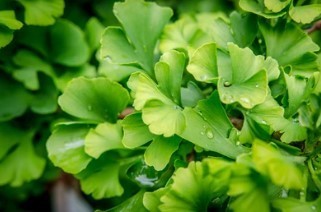Ginkgoaceae Plant Tissue Culture
 Green Ginkgo with water droplets.
Green Ginkgo with water droplets.
Ginkgo is a genus of deciduous gymnosperms relict
plants of the Ginkgo class. Our tissue culture
technology is capable of mass cultivation of Ginkgo
seedlings and facilitates industrial extraction of
secondary metabolites.
Ginkgoaceae, there is only one genus and one species in existence, Ginkgo biloba, which is native to China andcultivated in the United States, Japan, and other countries. Ginkgoaceae plants are dioecious and are deciduous trees with long and short branches. The leaves are fan-shaped and have long stalks.
Ginkgoaceae plants have important medicinal, economic and ornamental values. It will produce a variety of unique secondary metabolic compounds during the growth process, such as ginkgo flavonoids (which can prevent oral ulcers, inhibit the activity of lung cancer cells), ginkgolides (which can treat Alzheimer's disease and regulate blood lipids), and so on. Ginkgoaceae plants have graceful tree shapes and lush leaves and are widely used as garden landscape trees.
Tissue culture service
Although widely cultivated, the Ginkgoaceae plant is still listed as an endangered species. At the same time, with the research and development of its utilization value, traditional planting methods cannot meet the market demand.
For this reason, Lifeasible has established an efficient rapid propagation system and has widely applied tissue culture technology to Ginkgoaceae plant propagation, secondary metabolite extraction, and germplasm preservation. The tissue culture methods we provide mainly include organ culture, embryo culture, callus, and cell culture. We will choose the appropriate tissue culture method for you according to your different tissue culture purposes.
Organ culture
- Organ culture helps in the factory production of seedlings of Ginkgoaceae plants.
- We recommend choosing seed embryos, stem segments, and shoot tips with strong differentiation ability as explants, and White, N6, 1/2M, or MS with halved NH4NO3 content as basal medium. Plant growth hormones will be added to induce the production of clump shoots and adventitious roots, such as 6-BA, NAA, and KT.
- During the tissue culture of Ginkgo biloba, the browning of explants often occurs, and the addition of an appropriate amount of activated carbon can effectively prevent the browning.
Embryo culture
- Embryo culture is suitable for producing many seedlings of Ginkgoaceae plants.
- In general, we can use the cotyledons, ovules, leaves, embryos, young embryos and hypocotyls, and young inflorescence axes as explants to start the project. For mature embryos, we often use White as the base medium. For young embryos, N6 and MS are often used as basal mediums. 2,4-D was added during the induction of embryo germination.
- Cultural conditions have a significant influence on embryo culture. We usually limit the temperature to 25±2 °C, regulate the light to 40W fluorescent light for 10 h, and choose triangular flasks for culture vessels.
- The storage method of Ginkgoaceae plant seed affects embryo culture, and room temperature storage is appropriate.
Callus and cell culture
- Callus and cell culture play an essential role in utilizing cells to produce secondary metabolites.
- We recommend you choose leaves, young leaves, stem segments, root segments, cotyledons, embryos, endosperm, etc., as explants to induce callus. Depending on the explant type, we will choose the most suitable basal medium for you from B5, N6, MS, MT, White, etc.
- After the callus is formed, adventitious buds and roots can be induced on the inducing differentiation medium to obtain a complete plant; or it can be subcultured and expanded to extract beneficial secondary metabolites. We will choose different media and plant growth hormones for induced differentiation, subculture, or cell suspension culture according to your research purposes.
- Ammonium nitrogen and a sufficient supply of iron ions were beneficial to the induction of callus growth.
If you are interested in our services, please feel free to contact us for more information or to discuss in detail.
You want to sign a confidentiality agreement.
You have a specific plant species for your experimental needs.
You have a reliable and relevant cooperation project to discuss.
You are very interested in our project or have any questions.
You need an updated and detailed quotation.
For research or industrial use.

 Green Ginkgo with water droplets.
Green Ginkgo with water droplets.
